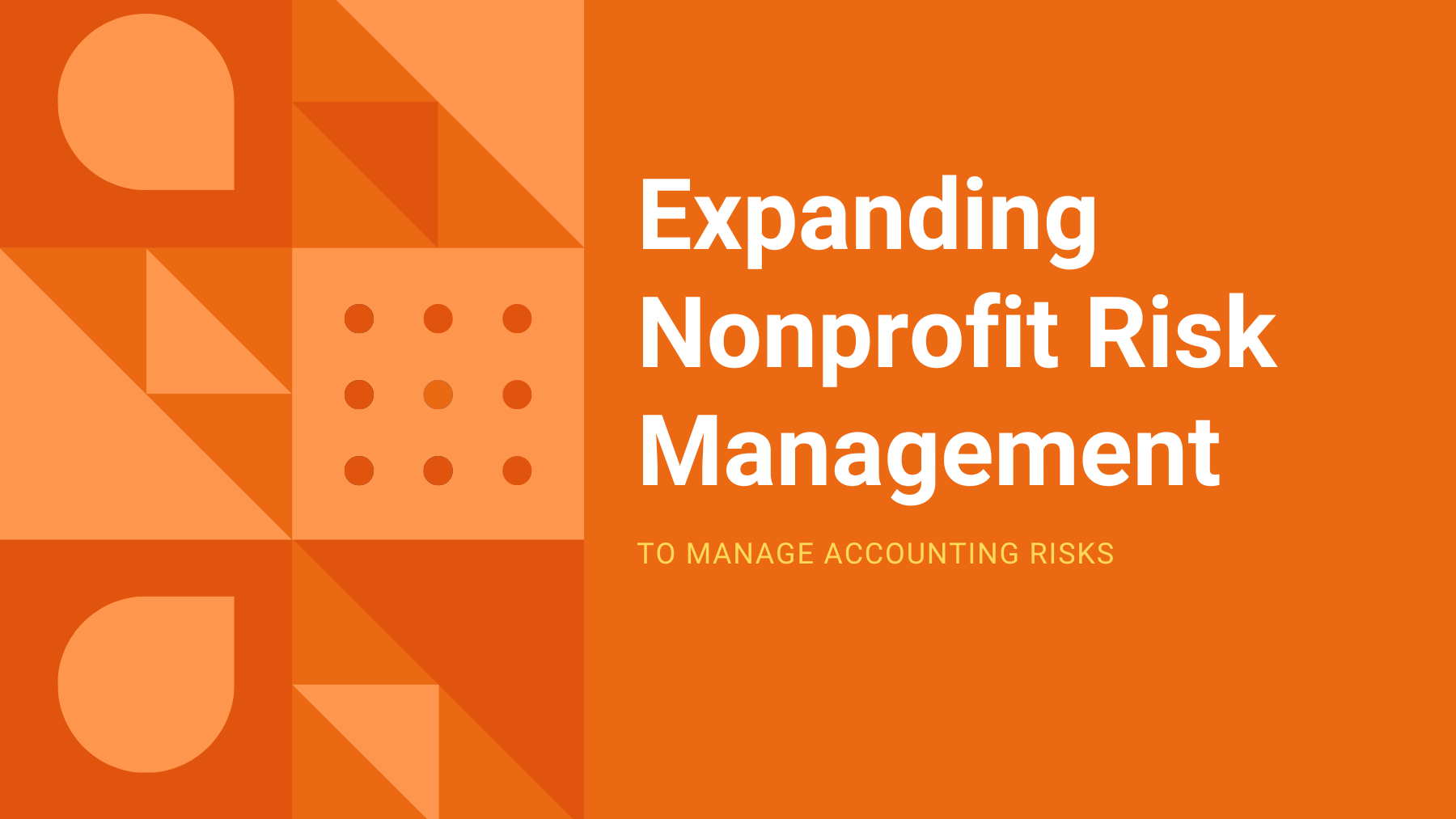
As nonprofits grow, many tend to find that their financial responsibilities gain added layers of complexity. For example, when a nonprofit is awarded grant funding, it sets in motion a need to secure more staff and deliver more frequent financial reporting. As nonprofits venture into diversifying their funding sources, they may face new taxation responsibilities or the threat of putting their not-for-profit status at risk. When nonprofits’ risk management strategies account for these financial hurdles, organizations will find their growth trajectories to be far smoother.
By adopting strong internal controls, prioritizing cybersecurity, and establishing a culture of accountability, nonprofits can reduce the risk to their financial systems.
Adopt strong internal controls
Risk is an inherent part of growth, but adapting your nonprofit’s risk management strategies to proactively account for accounting can help you weather these hurdles. Strong internal controls are the foundation of a proactive risk management approach.
Internal controls are the processes put in place to ensure your nonprofit’s financial integrity and to promote accountability. Robust internal controls can help protect nonprofits from fraud, as well as unintentional errors, external data breaches, and loss of data.
A knowledgeable accountant or outsourced accounting partner can help put controls in place that address potential vulnerabilities in financial systems, particularly as nonprofits prepare for growth. Auditors can also be an invaluable resource for strengthening internal controls. As a result of reviewing your internal controls year after year, your auditors already have insight into the effectiveness of your existing controls. They also have insight based on the best practices being applied across your industry.
Your auditors may also be able to point you toward emerging areas of focus. For example, many auditors today are prioritizing the implementation of disaster recovery plans and information security plans that address the integration between organizations’ IT department and their external vendors as part of a comprehensive nonprofit risk management approach.

Address risks around technology
Many nonprofits are finding that the shift to modern technology solutions offers their organizations significant advantages, including greater efficiency. However, this shift also carries greater security risks. As accounting solutions shift to the cloud or integrate with other internal systems and external vendors, nonprofits must prioritize cybersecurity strategies that keep their financial data secure.
There’s been an upsurge in cyberattacks in recent years, and small and midsize organizations make up a significant portion of the victims of these crimes. Phishing attempts – scams in which individuals are tricked into revealing personal information, such as passwords, to bad actors posing as reputable companies – continue to rise because they work. The Anti-Phishing Working Group observed nearly five million phishing attacks in 2023, making it the worst year for phishing on record to date. As ACH transfers have become the predominant method of sending and receiving money, bank accounts are at greater risk of fraud. With more points of access to cash accounts come more opportunities for hacking.
These schemes can lead to bigger problems for nonprofits. If a server or network is hacked, nonprofits’ sensitive financial or personal data – and credibility among stakeholders – is at risk.
As a result, accounting professionals and partners must prioritize cybersecurity measures as part of a solid nonprofit risk management strategy. This means making security investments and pursuing ongoing training. Everyone across your team should be knowledgeable about how to safeguard your assets. This training is essential for all new hires but should also be reviewed annually to remind your entire team of the risks to your financial data. Connecting with other nonprofits about lessons learned can further strengthen your cybersecurity approach.
Establish a culture of accountability
When nonprofits set clear expectations and implement internal controls that guide the handling of financial data, they’re taking the first steps toward creating a culture of accountability. This culture is important both for preventing misuse of funds and for securing the trust of all stakeholders, members, and donors.
A culture of accountability sets the stage for nonprofits to serve as good financial stewards. Accountable organizations clearly identify the individuals who need access to financial data and their responsibilities in working with and securing this data. They set procurement and spending parameters and link spending to the organizational mission and the value delivered to members and stakeholders. These organizations also embrace training and the ongoing adoption of accounting best practices.
Connect with a partner experienced in nonprofit risk management
As nonprofits grow to meet new opportunities, they should also proactively plan to address new risks, particularly in their accounting practices. Of course, forecasting the risks ahead is not always easy. That’s why many nonprofits opt to work with a third-party consultant who has helped other organizations weather these very risks.
While the experts at Vault may not have a crystal ball, we do have a solid foundation of experience supporting nonprofits like yours through every phase of growth. If you’re looking for a partner who can help you reduce your risk and support your growth, then it’s time to connect with Vault.






